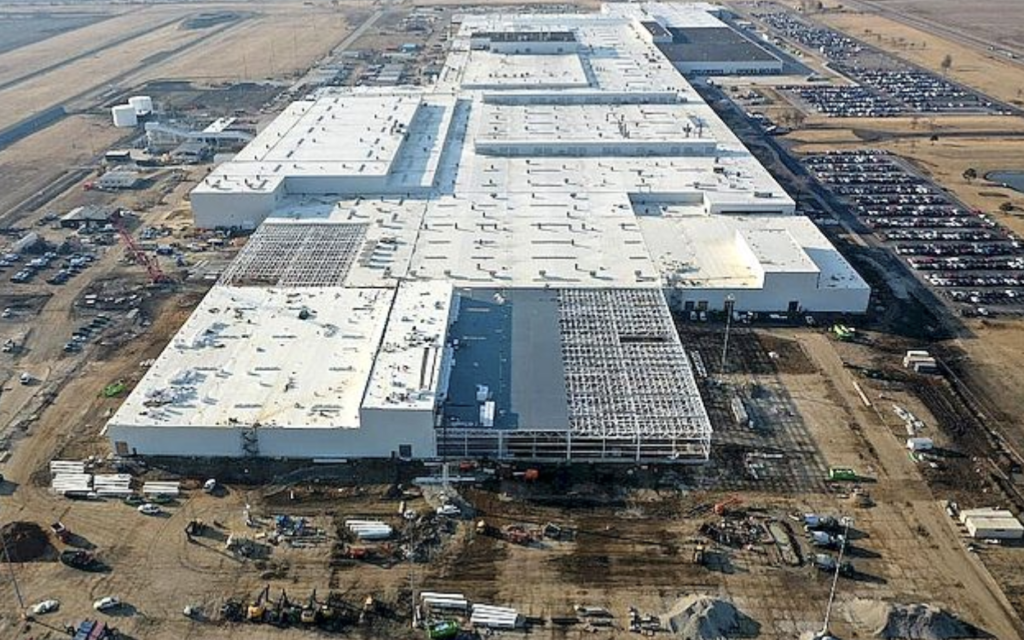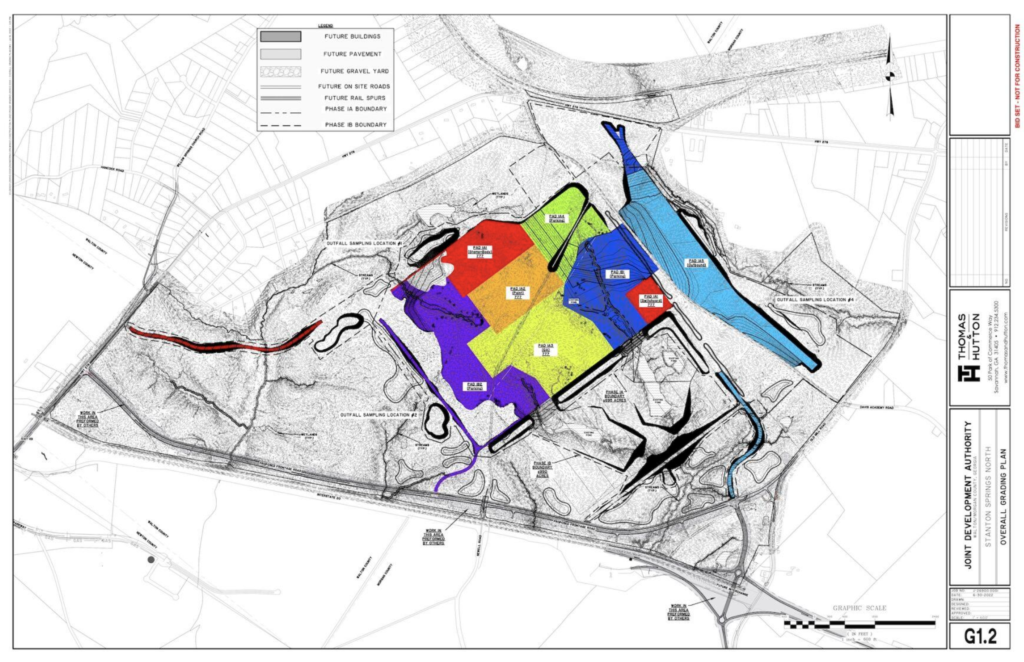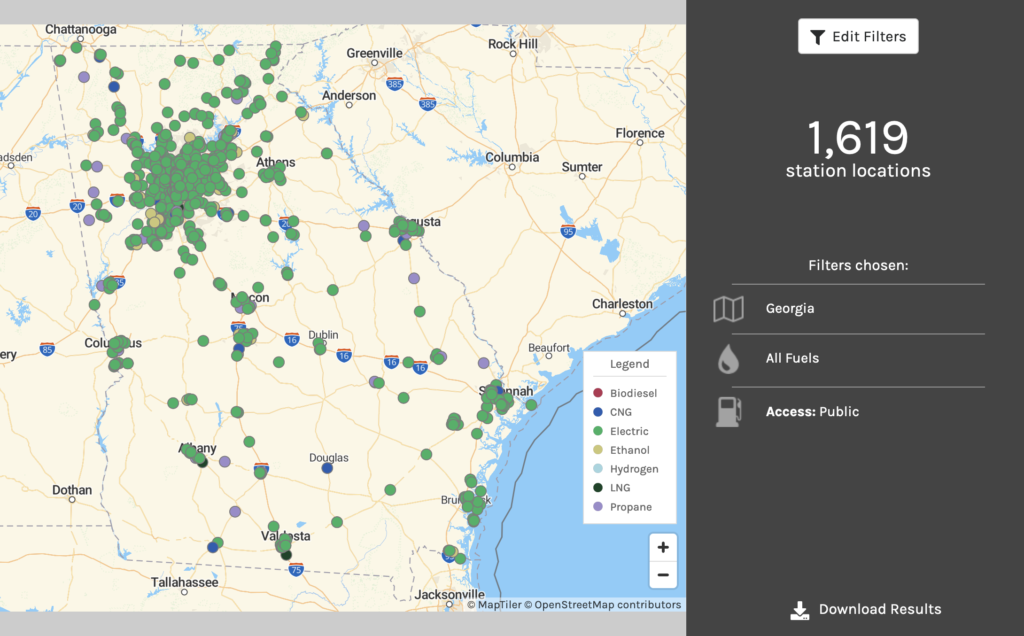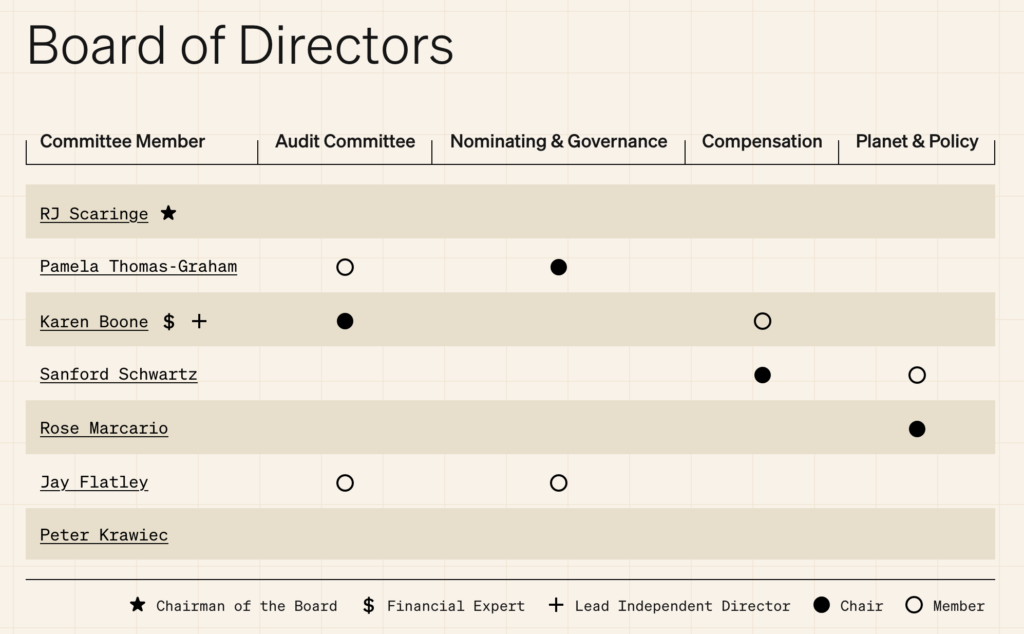Offering a reckless endorsement of Joe Biden's climate-change agenda, Governor Brian Kemp has bold plans to make Georgia the nation's hub for controversial electric vehicle (EV) manufacturing. On December 16, 2021, Kemp announced that "up-and-coming" Tesla rival Rivian Automotive would invest $5 billion in a 20 million square foot "carbon-conscious campus" in Georgia to produce its "electric adventure vehicles."
Considerable financing for the endeavor—which, at the time, represented the single largest economic development project in Georgia—is set to come from a bond-funded stimulus package of at least $1.5 billion and up to $15 billion. However, local anti-Rivian residents—the guardians and responsible stewards of the beautiful farm and timber land they call home—are unhappy, noting that the heavy industrial development will significantly disrupt the environment.
The nearly 2,000-acre location of the Rivian complex, known as the East Atlanta Megasite, is represented by the controversial Joint Development Authority (JDA) of Jasper, Morgan, Newton, and Walton counties and includes residential areas, forests, and historic farmland. Formed in 1999, the JDA bought the land and eventually brought in Baxter Pharmaceuticals in 2012, followed by several unplanned Facebook data centers that weren't part of the original vision delivered to residents. Still, the residents were accepting because both were non-polluting industries with decent jobs.
However, in December 2021, when Kemp announced his deal with Rivian, those same residents were shocked and dismayed. They discovered that thanks to non-disclosure and non-disparagement clauses preventing critical landowners in Morgan County from sharing alleged intimidation tactics used to encourage them to sign contracts, Rivian, the JDA, and other government officials had been in secret talks for months crafting the deal.
Undeniably, with the aforementioned $15 billion incentive package funded by bonds, the JDA's Economic Development Agreement is awash with controversy. Immediately, the plan faced ongoing objections from the community, who value the well-preserved landscapes and historic architecture the rural area offers.
[gallery columns="4" size="large" ids="47518,47520,47521,47522"]
Objections also arose from a recent study conducted by the Northeast Georgia Regional Commission (NEGRC), which corroborated the opposition held by the community. The study concluded that the Rivian development is "generally inconsistent" with Morgan County's 2017-2036 Comprehensive Plan prioritizing rural living, conservation, and gradual development for its less than 20,000 residents. Indeed, the plan—which was put in place to ensure that no large development would occur in the environmentally sensitive area—lists desired land uses to include "undeveloped land left in its natural state, agriculture, and low-density, large-lot residential homes."
[gallery columns="1" size="large" ids="47316"]
Environmental Concerns & Shady Dealings Around Rivian Plant
Additional developmental priorities for the pristine natural area adopted in Morgan County's 20-year comprehensive plan include "protecting water resources and the preservation of the agricultural economy." A concerned resident explained that the carefully constructed details of the amiable plan are what motivated her to relocate to the county five years ago, where the primary source of income is small farm agriculture. The same is true for many in the community who purposefully retired to the rural area seeking a leisurely life after living in larger cities.
However, the Rivian Automotive complex is in direct conflict with the community's comprehensive plan. Unfortunately, instead of respecting the deliberate plans of the community he serves, Gov. Kemp is helping Rivian convert the protected rural agricultural land into a high‐impact, high‐intensity development that will negatively impact groundwater recharge. Add to that, the facility will generate at least 6,700 tons of toxic, hazardous wastes annually that will need to go to a landfill. Once up and running, Rivian's plant is scheduled to produce 400,000 electric vehicles annually. A frustrated Bechtler emphasized:
"I chose this area because it's clean. There's no litter. There's no water contamination. We don't have landfills. We don't have trash everywhere. For me, riding out here, it was just spectacular."
For a vested community with no public utilities that intentionally relies on naturally filtered wells as its exclusive source of pure, clean water, the enormous Rivian factory will demolish and disrupt the very essence of their way of life. The group No2Rivian explained that the terrain Gov. Kemp wants Rivian to cover in concrete contains at least 29 acres of wetlands and an additional 232 acres of wetlands are within a mile of the site. (The group has a petition that can be viewed here.)
And most importantly, the site serves as a vital groundwater recharge area—a naturally-occuring place where the soil, foliage, and trees perfectly act as the filter for groundwater reserves. As nature intended (akin to the human body's natural immune system), the land soaks up and collects water from numerous sources, which is then pulled downwards by gravity. This amazing process is called groundwater "recharge." Layers of porous rock and sediment hold the water, eventually flowing back into streams, lakes, rivers, and oceans.
The U.S. Geological Survey reports that groundwater—one of the nation's most critical natural resources—is the source of about 37 percent of the water that county and city water departments supply to households and businesses. It provides drinking water for more than 90 percent of the rural population who do not get their water delivered to them from a county/city water department or private water company.
However, once Rivian covers—or essentially suffocates—the soil with 20,000,000 square feet of impervious surface for its manufacturing buildings (then adds roads, parking lots, its track, sidewalks, etc.) to complete its campus, the groundwater will be prevented from seeping down as it must to replenish the community's wells. Noting that 92 percent of the proposed Rivian site lies within a "Conservation" area, NEGRC reported that any building in that area is a huge concern.
[gallery columns="1" size="large" ids="47529"]
Without question, the Rivian Project represents a complex environmental problem impacting not just springheads on the property—which all become rivers that feed into lakes—but abundant natural wildlife, including the American bald eagles that call the land home. No2Rivian president JoEllen Artz explains more about the area's naturally clean water:
"By the time it's really deep, the water is as pure as you could ever want. The filtering process is done by the blades of grass, roots of plants and trees, passing through dirt and gravel, etc. Nature does a fabulous job of purifying water.
A study that was done by a state organization said that this Project will hurt our wells, keeping us from getting the same amount of water and as good quality of water. And that was before we learned that Rivian plans to build lithium batteries at the factory. Now there is concern that our water will be poisoned.
Rivian will ruin our landscape and countryside just as they are ruining the Sterrebos forest in the Netherlands. The CEO, RJ Scaringe, just wants to build a monument to himself."
To further illustrate the heavy influence of the Rivian deal, when the JDA realized that its rezoning application would most likely fail, it appealed to Gov. Kemp, who residents accuse of changing the rules to facilitate the deal as he sees fit. Kemp and the state over-rode Morgan County's zoning restrictions and rezoned the land as heavy industrial while creating what residents describe as bogus committees to "hear" the voices of the community. With committee meetings reportedly set for this spring, those opposed to the Project believe that transferring ownership to the state can be interpreted as "further seeking to cloak this process in the darkness of closed conference rooms."
Video taken on 1/04/2023 by Rivian opposition leader Chas Moore after 1.89 inches of rain in 24 hours. It provides an overview of Rivian Proposed site and the inability of Rivian, Georgia, and JDA to stop outbound contamination of private property, State Watersheds, and displaced wildlife being smothered with turbidity.
 Screenshot / Tesla plant in California. Rivian's Georgia plant will be over 5 TIMES larger.
Screenshot / Tesla plant in California. Rivian's Georgia plant will be over 5 TIMES larger.
 Screenshot / The current Rivian plant in Normal, IL which is 20% of the size of the proposed Georgia site.
Screenshot / The current Rivian plant in Normal, IL which is 20% of the size of the proposed Georgia site.
Rivian Deal Labeled "Worst of 2022," Judge Sides With Residents
With Rivian set to overwhelm the peaceful area in just two years, local opposition put together a stellar legal team to challenge the proposed funding of the company's plant and successfully intervened. On September 29, 2022, Morgan County Superior Court Judge Brenda Trammell denied the $15 billion in bonds, describing the bond structure as "a mechanism to obtain tax abatement for a private company for which there is no ability legislatively or constitutionally."
Judge Trammell's ruling dealt significant setbacks to Rivian's funding plans and the JDA's unprecedented incentive deal. Significantly, instead of paying property taxes, the arrangement had Rivian set to make at least $300 million in PILOT payments (payments in lieu of taxes) to the JDA for 25 years by asserting that the company's rental agreement would qualify as a usufruct—a legal status that would have permitted the JDA to lease the property to Rivian without requiring traditional property taxes.
An even closer look at the deal between Rivian, the state of Georgia, and the JDA discloses that the convoluted structure of the agreement was designed to sidestep the fact that the state has no law allowing for property tax abatement. Likewise, a Constitutional provision prohibits the government from granting "any donation or gratuity, or to forgive any debt or obligation owing to the public."
Thus, under the terms of Kemp's agreement, instead of paying to construct and equip their factory, the local JDA would issue bonds that Rivian—and only Rivian—would purchase. The money from that purchase would go into a "Project Fund" that would pay to build and equip Rivian's factory. The rent Rivian paid the JDA for its land would then be used to repay Rivian for the principal and interest due on the bonds.
Trammell wasn't buying it, and despite attempts by state and local officials to create tax breaks for Rivian "out of thin air," ruled that the JDA failed to provide the required proof that the $15 billion in bonds for Rivian are "sound, feasible, and reasonable" and that the massive Project would benefit the local counties invested in the new plant. Likewise, Trammell ruled that the terms of Rivian's rental agreement with the state and the JDA did not qualify as a usufruct, leaving the company responsible for standard property taxes. Trammell wrote in her final ruling:
"This lack of evidence provides an independent basis for the Court to decline to validate the bonds…[They must prove] the issuance of bonds and the security therefore are sound, feasible and reasonable. This is a requirement for validation of the bonds. The JDA failed to put forward sufficient evidence to support this allegation and therefore the request to validate the Bonds must be denied. The JDA failed to put forward sufficient evidence demonstrating that the Project would promote the 'general welfare within the territory of the Authority.'
Taken together, each of these provisions of the Rental Agreement demonstrate that Rivian would possess an estate for years, rather than a usufruct. As such, its interests in the property and the Project would be subject to ad valorem taxation."
Besides Judge Trammell and the concerned residents, the Center for Economic Accountability (CEA) has also been highly critical of Kemp's business dealings with Rivian. A December 27, 2022 report titled "Georgia's Rivian Plant Subsidy Recognized as 2022's "Worst Economic Development Deal of the Year" by the Center for Economic Accountability" declares that the outrageous deal "best exemplifies the massive wastefulness and ineffectiveness of government economic subsidy programs." Defining Kemp's absurd contract with Rivian (which recently lost several top executives), CEA President John C. Mozena proclaimed:
"In the worst year ever for giant state and local corporate welfare deals across the country, Georgia's $1.5 billion Rivian subsidy still managed to stand out for the way that bureaucrats and elected officials completely failed in their responsibilities to the state's residents and taxpayers.
They made a massive, speculative investment of taxpayer money in an early-stage company in a highly competitive and government policy-dependent industry without doing basic due diligence. They went to great lengths to get around the fact that Georgia has no law that gives them the authority to hand out property tax breaks. They didn't do their homework on the downsides of this Project for the communities where the plant would be built, they kept the people who would be impacted the most in the dark until the deal was almost done and then they went to great lengths to keep local leaders from having a say in what happens to their communities."
DzU3WA9eQAUVgUzpGbg8Sw
Mozena underscored the poor leadership displayed by Kemp and others seeking to bring Rivian to Georgia at any cost, commenting that "one of the big things that stands out about this deal is that a judge got agency bureaucrats on the record effectively admitting that they did about the same amount of due diligence into a speculative investment with a billion and a half of taxpayer dollars as we'd expect from some diamond-hands meme stock trader on Reddit."
Indeed, with Rivian's vehicles largely not qualifying for federal tax credits because of their hefty price tag, Mozena noted that the company readily admits in its government filings and investor materials that challenges like supply chain limitations, negative cash flow, tough competitors, lack of experience, existing debt, and other scenarios are obstacles to its future success.
In February 2022, Rivian investor George Soros lost nearly $1 billion after a prolonged plunge in the company's share price. Likewise, Stakeholder Amazon, who (along with T. Rowe Price, Ford, and BlackRock) invested $1.3 billion in Rivian in 2019 as part of a company plan to "go green," took a $7.6 billion loss on its shares in April 2022.
Regardless, and with no clear-cut guarantee from officials that Georgia taxpayers won't be left holding the bag if the deal fails, Mozena emphasized that Georgia politicians and bureaucrats "go all-in with a billion and a half of taxpayer money" as if this is "a slam-dunk investment." Expanding on the "speculative investment with taxpayer dollars," he stated:
"If Georgia's economic development agency staffers were truly able to identify which companies are going to emerge successfully from the volatile scrum of startup EV manufacturers, then they'd be making millions on Wall Street rather than civil service salaries in state capitals or city halls.
It's worth noting that virtually everything we know about this deal is thanks to a judge doing her job and making sure that government agencies had to answer hard questions under oath. In a year where there were four times as many multi-billion dollar subsidy deals than ever before, we have to ask just what we'd discover elsewhere around the country if we had the same kind of transparency into every deal."
Undeterred by Trammell's September 29, 2022 ruling, top officials at the Georgia Department of Economic Development (GDEcD) immediately fired back. Insisting the denial of bonds will in no way delay the Project, Commissioner Pat Wilson directly challenged the judge's assessment that authorities fell short in analyzing Rivian's financial health and its impact on the surrounding communities. Wilson and Andrew Capezzuto, the agency's chief administrative officer and general counsel, confirmed the state's clear intent to challenge Trammell's ruling in favor of the local citizens' coalition, whose opposition to the historic Project has proved resilient.
 Screenshot / no2rivian / We the People are ultimately in charge.
Screenshot / no2rivian / We the People are ultimately in charge.
In late October 2022, the GDEcD and the JDA of Jasper, Morgan, Newton, and Walton counties submitted a notice of appeal to the Georgia Court of Appeals challenging the ruling, which shows a calendar date of February 2023. With the Rivian case far from being settled and its potential broader impacts impossible to gauge, national site consultant John Boyd, Jr. of The Boyd Company sees the challenge as symbolic of "an era of multi-pronged attacks against corporate incentive awards." In November 2022, Boyd shared with Site Selection, "It's at a whole new level of intensity and sophistication. The level of scrutiny has brought on an army of eagle-eyed lawyers and judges, as we now see with Rivian."
Army Corps of Engineers' Steps In Allowing Development to Continue
Meanwhile, on December 28, 2022, as the GDEcD and JDA await its appeal ruling, the U.S. Army Corps of Engineers issued a critical federal Clean Water Act Section 404 permit allowing the Rivian assembly plant project to move forward. The permit was required to develop the 2,000-acre site and will allow development on the entire site rather than just the 500-acre section it has already been grading in recent months.
According to the Environmental Protection Agency (EPA), Section 404 regulates the use of fill dirt for site development, water resource projects such as dams and levees, infrastructure development such as highways and airports, and mining projects. It requires a developer to receive a permit before dredged or fill material may be discharged into U.S. waters, including wetlands, and provides compensation for all remaining "unavoidable impacts." Speaking of what they perceive as a "victory" following the permit approval, the GDEcD said in a statement:
"To earn this approval, the state and JDA have demonstrated that the project planning has avoided and minimized impacts to wetlands and streams to the maximum extent practicable and that all unavoidable impacts will be fully mitigated for. As part of its standard public interest review, the Corps sought and received public comments on the permit application, which the state and JDA carefully reviewed and provided detailed responses to. The excitement surrounding Rivian's new Georgia home is growing daily as we continue to create the future together."
 Screenshot / Overall Grading Plan showing the area to be graded for construction of the Rivian Automotive assembly plant. The grading is being done in stages.
Screenshot / Overall Grading Plan showing the area to be graded for construction of the Rivian Automotive assembly plant. The grading is being done in stages.
Without question, local residents are disheartened by the Army Corps' issuance of the permit. As previously mentioned, they are, among other things, concerned about the quality of their drinking water after the expansive Rivian construction. They are calling for Gov. Kemp to put the entire Project on hold until the bond issuance case is resolved. JoEllen Artz, a previously mentioned leader of No2Rivian, called the 404 permit "devastating," adding, "we are saddened that the U.S. Army Corps of Engineers failed to put our well-being above a polluting lithium battery and electric vehicle production facility." Artz echoed the movement's plea to Kemp to pause the Project, stating:
"At this critical point, Governor Kemp could step forward and say that the Project is on hold until the legal system has had its say about the bond issuance; why destroy more land for a factory that may never be built?
Wall Street also says that Rivian is one of several 2022 IPOs that may never survive 2023. Does Governor Kemp really want an abandoned Rivian construction site that may or may not be suited for whatever industry replaces it? He can proudly say he is going to take the moral high road right now and put this Project on hold or face national and international embarrassment when this Project fails."
Unfortunately, the resident's pleas continue to fall on deaf ears. Determined Rivian leaders have joined GDEcD in celebrating the approval of the 404 permit. Speaking of its approval, the company, which received a loud shoutout from Joe Biden in early 2022, said in a statement to the Atlanta Journal Constitution (AJC), "With this expected and necessary next step, Rivian remains excited to work with Georgia to bring good paying manufacturing jobs to the state while respecting the natural environment in which we operate."
Still, outspoken anti-Rivian member Felton Jenkins III is disheartened by the 404 permit approval. A Rutledge native who claims his family was threatened with land condemnation to sell off property for the Rivian Project, Jenkins commented:
"This industrialization is in violation of Morgan County zoning regulations. Subsidizing a private company, the risky start-up California based Rivian, Inc., is not a public purpose.
Rivian is not 'respecting the natural environment' by forcing through this Project in this rural location. This empty talk is called 'greenwashing.' A company that cared about conservation would build their factories and battery plants on land that has already been industrialized and zoned for such use. Georgia is among the top three states in America that is converting and paving over agricultural land and greenspace. Joni Mitchell sang, 'they paved paradise and put up a parking lot.' To many people, this area is a rural paradise."
VHHtykLj0bQQMOSifslD6g
A Closer Look at Rivian's Mysterious Past and Present
Many loyal, rural-Georgia-loving residents remain unimpressed with Rivian. As they await a decision on the JDA and the government's appeal to Judge Trammell's ruling, it's essential to remember that the EV push—including promoting and funding Rivian—is fueled by the global elite's self-serving Great Reset agenda, which is currently laser-focused on climate change. Just look around; the enormous coercion surrounding the "green energy" push is mind-boggling, exactly like Kemp's push to bring Rivian to Georgia.
 Screenshot / Georgia Charging Infrastructure / Alternative Fuels Data Center
Screenshot / Georgia Charging Infrastructure / Alternative Fuels Data Center
For its part, Rivian was founded in 2009 by Robert J. Scaringe. The company is a spinoff of Mainstream Engineering, a Florida-based, U.S. government-contracted developer and manufacturer of numerous products, including thermal control and energy conversion goods, and even the first-ever biomass cooking stove to reduce CO emissions. Proves to be a tad thought-provoking with the recent headlines surrounding gas stoves. Anyway, receiving significant funding from partnerships with the U.S. government, Mainstream Engineering was founded nearly thirty years ago by Scaringe.
Nevertheless, mystery has surrounded little-known Rivian for years. The company made headlines in 2017 after it snatched up a former $100 million Mitsubishi factory in Illinois. Before that, according to an article published in The Drive, Rivian received $1.5 million from the state-funded Space Florida organization. Following that, it retained a $2 million grant from the Florida Office of Energy to build a lightweight modular prototype vehicle, which it delivered to NASA in 2012. Apparently, the prototype was later leased back to Rivian for further research.
Rivian eventually made headlines in the EV climate change narrative in September 2019 when Amazon agreed to purchase 100,000 electric vehicles from the company—the largest order of EV delivery vehicles ever. Then Rivian hit the mainstream news again in July 2020 when—despite having never released a vehicle—the company raised $2.5 billion in funding led by existing investors T. Rowe Price, Amazon, and Ford Motor.

Notably, the credentials of Rivian's Board of Directors read like a page straight from Klaus Schwab's World Economic Forum. The eight Board members have ties to Blackrock, Amazon, MIT, Harvard, Stanford, Credit Suisse Group AG, NBC, CNBC, McKinsey & Co., Peloton Interactive, and Cox Enterprises. The Cox empire includes Cox Automotive and Cox Media, which owns the AJC.
For those unaware, WEF partner Cox Enterprises, held by Georgia's wealthiest family, owns a 4.7 percent stake in Rivian and supplies services to Rivian. Sandy Schwartz, a Cox executive who oversees the AJC, is on Rivian's board of directors and holds stock personally. National stories about opposition to the plant have consistently made no mention of Cox's connection to Rivian or Kemp's connection to Cox, for that matter. Some have argued that Cox Media was Kemp's biggest ally (and a campaign donor) in surviving "Trump's wrath" in the last election, wondering further, "was that [alliance] to preserve democracy or [Cox's] own oligarchy?"
The list of Rivian Board member connections goes on to include Cox Automotive's Autotrader, General Magic (which was spun-off from Apple computer), genetic sequencing company Illumina, the Wellcome Trust's Wellcome Leap Fund, The Salk Institute, and numerous biomanufacturing (prominent in the "climate change" game) and biopharmaceuticals companies. Moreover, ties exist with Patagonia, plant-based food company Meati, Inc., and Zymergen, touted by the WEF as a tech pioneer and the world's first molecular manufacturing technology company.
 Screenshot / Rivian Board of Directors
Screenshot / Rivian Board of Directors
In Addition to Rivian, Gov. Kemp's Green Deals Keep Coming
Following his monumental deal with Rivian, Kemp has continued to expand Georgia's EV and Build Back Better foothold. On December 8, 2022, Kemp announced that Hyundai Motor Group and SK On (a lithium battery subsidiary) had selected a site in Bartow County for a new electric vehicle battery manufacturing facility to supply Hyundai Motor Group's plants in the country. State and local officials wooed the South Korean automaker to Georgia using an incentive package valued at more than $1.8 billion.
Although wiped from discussion and absent from mainstream news, it would be remiss not to mention Georgia's strong business ties to communist China, which are thriving. A now deleted webpage from Georgia's official website promotes why Chinese businesses choose the state, declaring, "The first-class global business environment, preferential taxation and policy support, the most developed logistics network in the United States, a large number of skilled workers, and emerging high-tech enterprises are all the reasons why Chinese-funded enterprises have settled in Georgia."
Focusing on "green" and silent on China, just last week, Kemp announced that Korean solar panel maker QCells would invest over $2.5 billion in new solar panel plants in Georgia—the largest solar investment in U.S. history. Yet, although climate change is currently an extremely lucrative problem, some warn that the technology industry's amplified push to "solve" climate change may actually make things worse. And ultimately, coal and natural gas are needed to produce "green" energy alternatives. Regardless, Kemp, who has clearly chosen to ignore such warnings, praised his scheme to transform Georgia into the national technology hub of the burgeoning EV industry (don't worry, he's fixated on solar and battery manufacturing too, and wind may not be too far behind), stating:
"Building on the assets that make the automotive industry successful, Georgia is positioned as a hub for the electric mobility industry. Since 2020, more than 30 EV-related projects have announced more than $21 billion in investment and announced more than 26,300 jobs in Georgia."
It is unacceptable how much valuable land is being covered and destroyed in Georgia to appease climate change. Now may be the exact right time to save paradise—the natural environment—and forego the massive "green" factories and parking lots.


